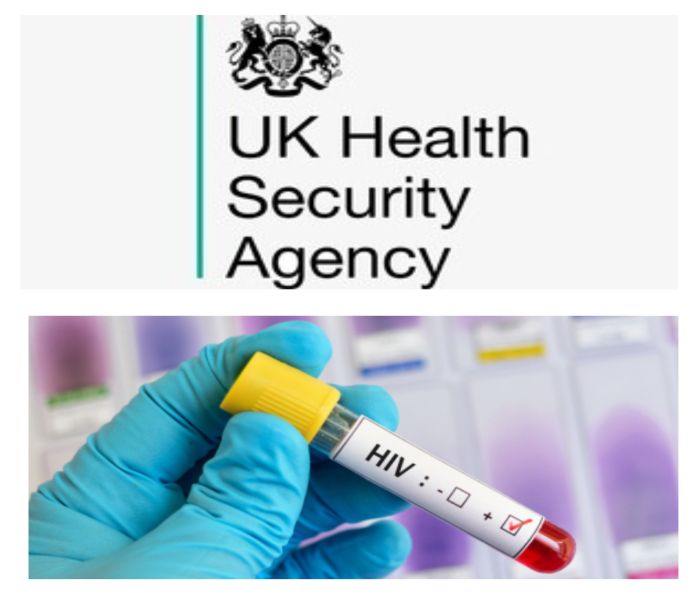- Latest data from the UK Health Security Agency (UKHSA) also highlights that testing remains lower than before the COVID-19 pandemic.
LONDON, England – The latest HIV surveillance data for 2023, published by the UK Health Security Agency (UKHSA) October 1, show that the number of heterosexual men and women newly diagnosed in England with HIV has increased by more than 30 percent since 2022, UK Health Security Agency, announced.
Diagnoses among heterosexual men rose by 36 percent (445 in 2022 to 605 in 2023) and among heterosexual women by 30 percent (602 in 2022 to 780 in 2023). The rise in cases was steepest for ethnic minority heterosexuals (excluding white ethnic minorities) with a 45 percent rise seen in this group compared to the previous year.
While HIV testing in sexual health centres overall increased in 2022 compared to 2023, it remains lower than before the COVID-19 pandemic. Regular HIV testing is vital to help prevent new infections. It allows people to have access to prevention interventions (such as HIV pre-exposure prophylaxis, PrEP) and ensures timely access to treatment that saves lives and prevents the virus being passed on.
Testing in sexual health clinics has increased by 34 percent since 2019 in gay, bisexual and other men who have sex with men (GBMSM), however testing has fallen in heterosexual men (by 10%) and in heterosexual and bisexual women (by 22%) since 2019.
Overall, the number of HIV diagnoses first made in England increased by 15 percent from 2,451 in 2022 to 2,810 in 2023. UKHSA is working with partners to further explore the reasons for this rise in new diagnoses. Contributing factors may include the contribution of the opt-out blood-borne virus testing in emergency departments (ED) programme, clinics not reporting some diagnoses which have been previously diagnosed abroad, or underlying transmission.
The latest data also highlight:
- For those diagnosed and linked to services, HIV care remains excellent with 98 percent of people with diagnosed HIV treated and 98 percent of those on treatment are virally suppressed.
- The number of diagnoses in GBMSM rose by 7 percent (761 in 2022 to 811 in 2023).
- In 2023, 33 percent (266 of 811) of diagnoses among GBMSM occurred among ethnic minority men compared to 26 percent (321 of 1,242) in 2019.
- When including those first diagnosed abroad, there were 6,008 HIV diagnoses in England in 2023, an increase of 51 percent from 3,975 in 2022. In 2023, 53 percent (3,198 of 6,008) of diagnoses were reported to UKHSA as being previously diagnosed abroad, the first time that both the number and proportion of diagnoses previously made abroad have exceeded those of new diagnoses first made in England. People previously diagnosed abroad were linked to care promptly (92% within one month of their England diagnosis and 96 percent within 3 months) 70 percent (2,125 of 3,048) of people with viral load information available were virally suppressed within a month of their diagnosis in England, indicating access to antiretroviral therapy (ART) abroad prior to arrival in England.
Dr Tamara Djuretic, co-head of HIV at UKHSA, said:
“It is clear that more action is needed to curb new HIV transmissions, particularly among heterosexuals and ethnic minority groups. Addressing these widening inequalities, ramping up testing, improving access to PrEP and getting people started on HIV treatment earlier will all be crucial to achieving this. HIV can affect anyone, no matter your gender or sexual orientation, so please get regularly tested and use condoms to protect you and your partners’ health. An HIV test is free and provides access to HIV PrEP if needed. If you do test positive, treatment is so effective that you can expect to live a long healthy life and you won’t pass HIV on to partners.”
Minister for public health and prevention Andrew Gwynne, said:
“This data shows we have much more work to do and brings to light concerning inequalities in access to tests and treatments. I will be working across government to ensure that we work to stop HIV transmissions for good. Our new HIV Action Plan aims to end transmissions in England by 2030 with better prevention, testing and treatment.”
Since HIV PrEP was commissioned by the NHS in autumn 2020, the number of people taking PrEP has increased annually. Department of Health and Social Care (DHSC) with UKHSA, NHS England and partners have begun the development of the next HIV Action Plan.





